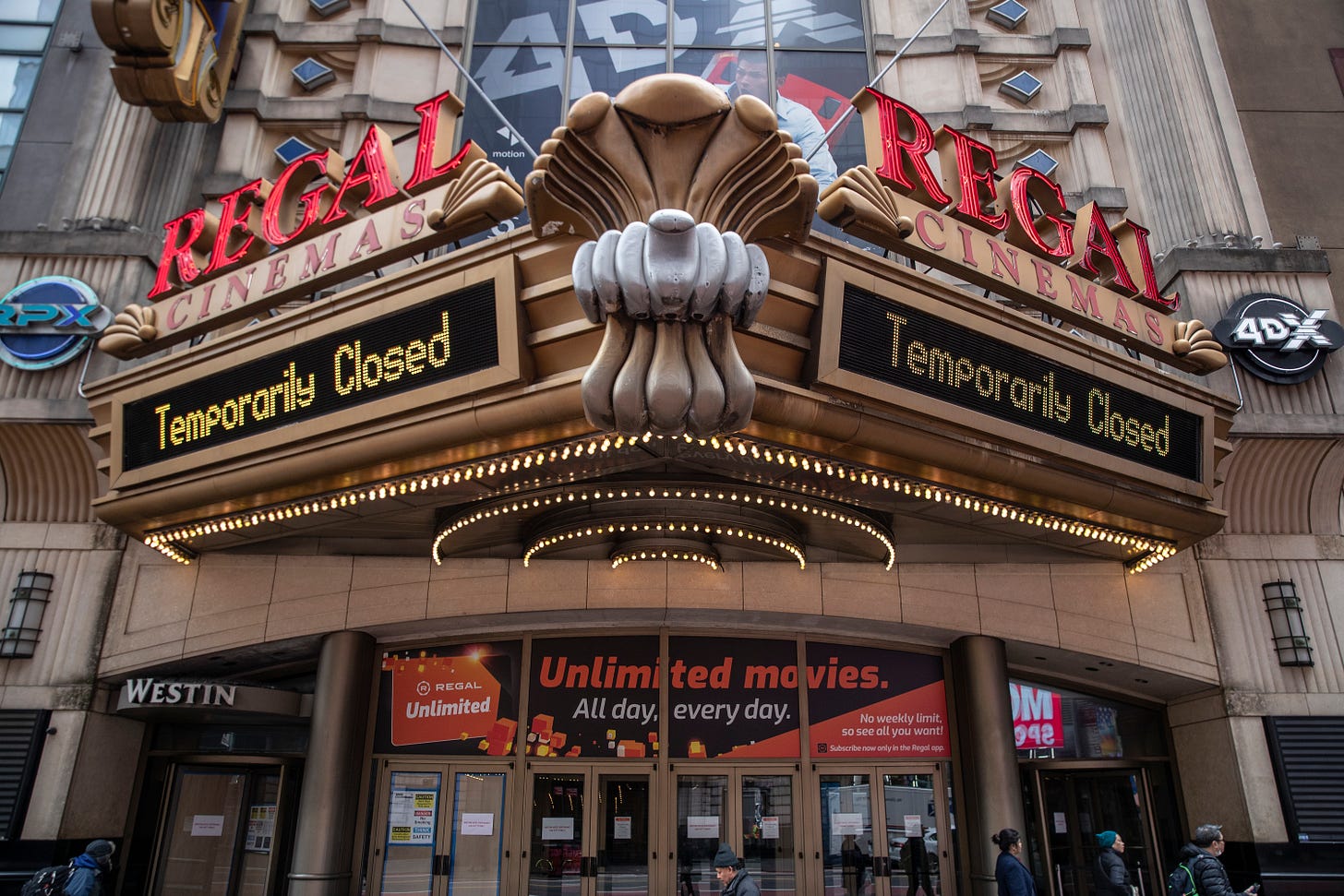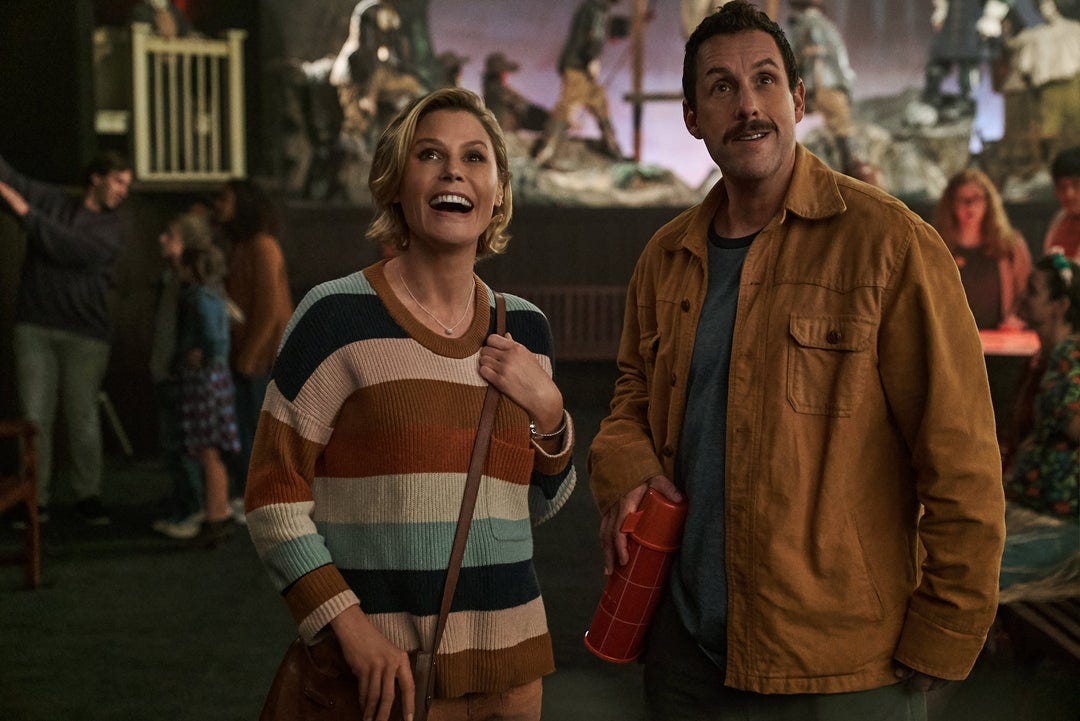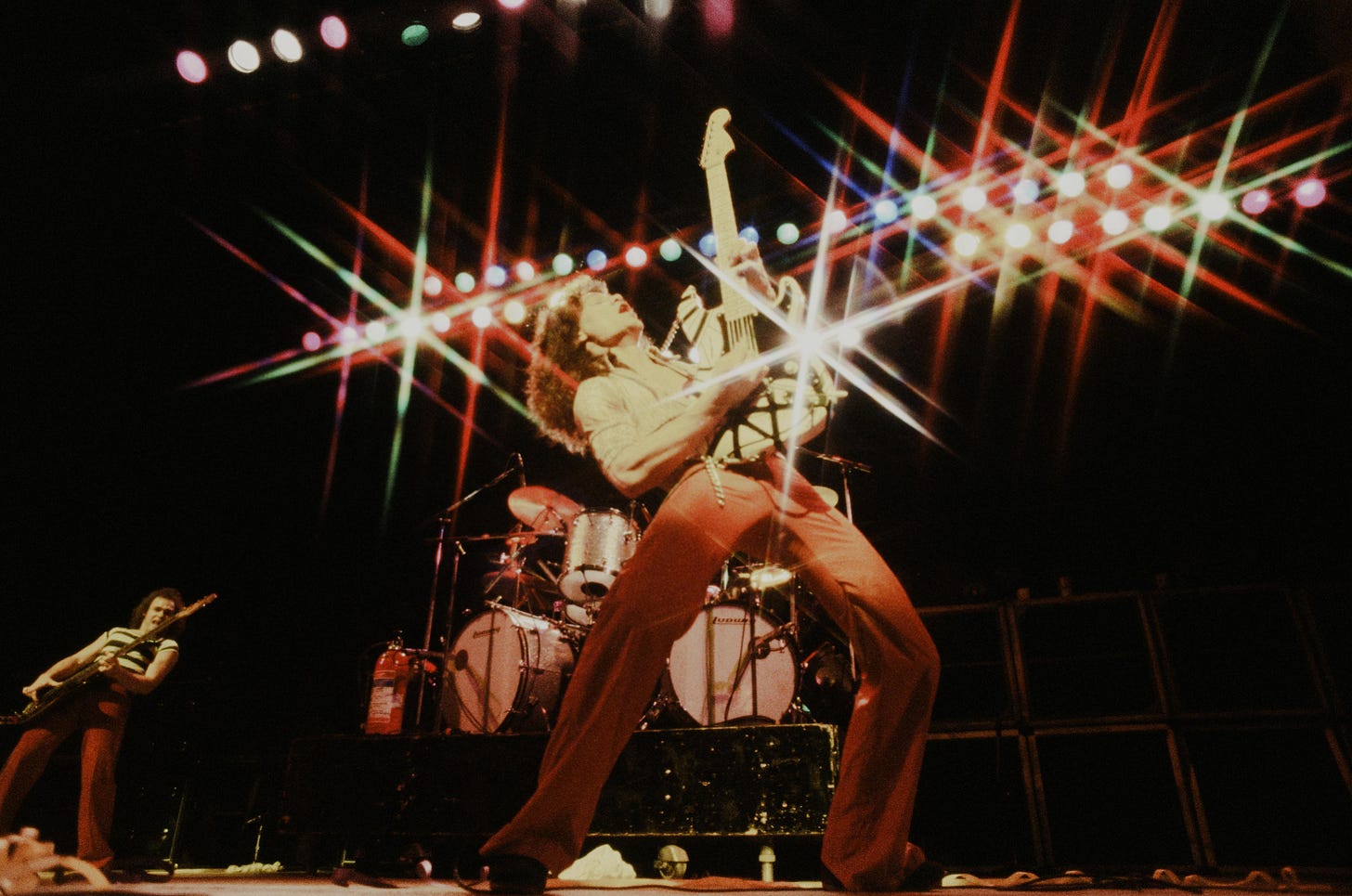Studios Have Screwed Theaters
Plus: 'Hubie Halloween' reviewed and Eddie Van Halen remembered
Theaters Needed Help. Studios Provided None.

I discussed the possibility of government assistance for movie theaters in this newsletter last week, and the subject came up again in the latest episode of The Bulwark Goes to Hollywood, where I spoke with Phil Contrino from the National Association of Theater Owners. I’m generally wary of such bailouts, but this isn’t an instance of a business that has made poor choices or failed to adapt to trying times: These are extraordinary times that may call for extraordinary measures.
This week, though, I’d like to focus on another angle: the partnership between studios and exhibitors and the inability—or unwillingness—of studios to act like good partners over the last few months.
Consider, first, the terms that Warner Bros. asked for when allowing Tenet to be shown in theaters:
Because Warner Bros. will have to make money gradually from “Tenet” amid theater attendance caps and a slower pace of ticket sales, the studio is requiring multiplexes to show the movie for up to 12 weeks, a considerable increase from the standard commitment. That is on top of charging cinemas nearly 65% of ticket sales to show the film, instead of closer to the widely accepted 50/50 split, according to a person familiar with the deal terms.
The 12-week run isn’t that big of a deal, given that, well, there isn’t much else to play. It’s not like there’s a ton of new product coming in to push Tenet off the best screens.
But that revenue split is kind of a big deal. It’s onerous—a friend in the exhibition business described it as “Star Wars money,” referencing Disney’s notoriously stingy dealings with theaters for space-based tentpoles—just one more blow to theaters already suffering from caps on attendance that keep screens from playing in front of full, or even half-full, auditoriums. While it’s understandable that Warner Bros. would ask for that kind of revenue split—they’re holding all the cards—it’s deeply harmful for the theaters themselves.
More harmful than that is the simple lack of product. Studios aren’t giving theaters anything to show other than repertory product (classics like Empire Strikes Back as well as “classics” like Hocus Pocus). And while my sources suggest that studios are being much more generous on the revenue splits for those older films, it doesn’t really matter: you can’t keep theaters open with 40-year-old classics and nostalgia traps for xennials who lack taste.
MGM pulling No Time to Die’s release date and WB pushing Dune back to next year were the last straws for Regal, which, by the time you get this, should have “temporarily” shuttered their screens again. The Alamo Drafthouse locations in my home base of Dallas have all closed again as well, refunding audiences who purchased tickets to this weekend’s now-canceled screenings. (So much for that 12-week Tenet run.) And while AMC and Cinemark have pledged to stay open no matter what, one wonders how long that resolve will last without new product hitting movie screens on a regular basis.
Studios and theaters have a symbiotic relationship: There’s no way for a $200-million movie to make money on PVOD or via streaming service. The economic structure of Hollywood as it exists now requires a theatrical window. But if studios don’t do a bit more to help theater owners out, that open window is going to narrow to a crack, at best. And when it slides shut, it will take a huge, and irreplaceable, chunk of revenue with it.
Review: Hubie Halloween (Netflix)

After Wednesday’s night VP debate—a rather dreary affair, with much complaining about interruption and many bald-faced lies and the occasional dash of brazen bullshittery—I needed a palate cleanser. Something light, something a little silly.
Hubie Halloween was just what the doctor ordered.
The latest Adam Sandler original for Netflix, Hubie Halloween is a nostalgia trap for xennials who have taste. It’s a return of form of sorts for Sandler, master of goofy faces and odd dialects: his Hubie Dubois is a figure of fun in the town of Salem, an absurd deli owner who scares easily but doesn’t let his jumpiness stop him from celebrating Halloween. When people start going missing during the holiday’s celebrations, however, the town is glad to have someone around who pays a little more attention than he needs to.
The plot here is not particularly important. What I can’t stress enough is how familiar the film feels. But not in the way you’ve come to expect films to feel familiar: It’s an original property, with original characters, and no cheap CGI explosions (though there is one funny running gag about Hubie dodging obviously-CGed missiles of various stripes as he rides his bike around town).
No, it feels familiar in the way that a class reunion feels familiar. Anyone who grew up on Sandler’s classic comedies Happy Gilmore and Billy Madison will know what I mean, and you’ll know it immediately, with the first cameo. I don’t even want to spoil it for my fellow Sandler-savvy xennials; you have to experience it for yourself. It may have been the drinks I was required to consume to get through the debate, but when I saw the first actor onscreen, dear reader, I yelped.
Sandler’s a convenient punching bag for folks who think his Netflix comedies are lazier and less worthy of watching than his prestige efforts like Uncut Gems. But this has always felt somewhat beside the point. Sandler’s living the dream: he gets to make movies he wants while hanging out with (and employing) his friends. Among others, this picture features guest appearances by Kevin James, Rob Schneider, Tim Meadows, and Colin Quinn. Early Sandler-world stalwarts like Julie Bowen (Happy Gilmore) and Steve Buscemi (Billy Madison and a boat-load of others) have key roles; even Shaq (Grown Ups 2) gets in on the action.
Hubie Halloween isn’t high art, but it is funny and sweet and has a nice little message about the importance of kindness, to friend and foe alike. It’s a solid family movie: silly enough for kids and winking enough for adults that no one’s likely to be upset if you throw this on for an evening in. (Anyone who doesn’t get a laugh at the running gag between Meadows and Maya Rudolph as an unhappily married couple is dead inside.) And it’s a pleasant throwback to a simpler time when an SNL star with a rubber face and an awkward burble could make us laugh harder than just about anyone else on the planet.
Assigned Reading: Chuck Klosterman on Eddie Van Halen

Eddie Van Halen died this week after a battle with cancer, prompting some discussion in the office Slack about their place in the rock band canon. (Spoiler: JVL was wrong. Just trust me when I tell you this.)
But it called to mind one of my favorite pieces of writing about music, ever: Chuck Klosterman’s profile of Eddie Van Halen for Billboard magazine. You can read it in Klosterman’s must-own collection, X, or by clicking here. It’s a really interesting glimpse into a rare sort of genius, the most surprising element of which is Eddie Van Halen’s complete lack of interest in listening to music. It was baffling when I first read the profile two or three years ago; it remains baffling now. I simply don’t understand it.
Then again: I’m not a genius craftsman who revolutionized his instrument. So maybe I don’t need to understand it. Just accept it.


